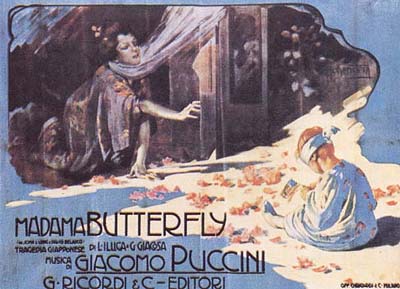by Jarrett Hoffman
IN THIS EDITION:

•Calendar additions and revisions: BW and Steinway, Sacred Heart Concert Series, Opus 216, and Urban Troubadour
•Opportunities for students: Sphinx Performance Academy at CIM and Double Reed Day at Cleveland State
•Byrdle: a choral-music-themed variation on Wordle
•Almanac: the failed premiere of Puccini’s Madama Butterfly
TODAY’S SCHEDULE:
Three events take place tonight at 7:30 pm.
In Akron, Jeannette Sorrell leads Apollo’s Fire and Apollo’s Singers in Handel’s Israel in Egypt. In Oberlin for the Winter Term Opera, Tiffany Chang leads Conservatory musicians in The Puppy Episode, receiving its premiere. And in Cleveland, guest conductor Stéphane Denève leads The Cleveland Orchestra in works by Guillaume Connesson, Mahler, and Ravel — his song cycle Shéhérazade, featuring soprano Fatma Said. As a heads up for Friday morning at 11:00 am, the Orchestra will repeat that program without the Ravel.
Details in our Concert Listings.
CALENDAR ADDITIONS & REVISIONS:
On Saturday, February 19 at 7:00 pm, the Steinway Piano Gallery Cleveland and Baldwin Wallace Conservatory will celebrate a new instrument being introduced to the Conservatory’s all-Steinway forces. The concert, “Spirio|r Soirée,” is named for Steinway’s high-resolution player piano model, and features BW faculty and students as well as Spirio specialist Michael Cabe joining live from New York City. Reserve free tickets here.
The following day at 5:30 pm, the Sacred Heart Concert Series in Oberlin will present the Steven Plank Trio (pianist Ohad Nativ, violinist Johnum Palado, and cellist Maxwell Schultz). They’ll be joined by cellist Aaron Lieberman in a program titled “From Bach to Henze: An Exploration of Germanic Music Throughout the 18th-20th Centuries.” The program will also be streamed. More details here.
A string quartet from the ensemble Opus 216 will head to Suite 226 in Cleveland on Friday, February 25 at 8:00 pm, bringing with them a program of Romantic and Classical favorites, original music, and vintage jazz. The key word throughout is romance, with candles, floor cushions, and plush pillows adding to the ambience. Details and tickets here.
And Urban Troubadour’s March 13 celebration of Piazzolla with the Oblivion Project has been postponed until April 2023.
OPPORTUNITIES FOR STUDENTS:
The deadline to apply for this summer’s Sphinx Performance Academy (SPA) at the Cleveland Institute of Music is Friday, February 18. A full-scholarship program devoted to chamber music and solo performance with a focus on cultural diversity, SPA accepts string musicians ages 11-17. Details here.
And the Cleveland State University School of Music will host Double Reed Day on Saturday, February 19 from 9:00 am to 4:00 pm. Led by two CSU professors (oboist Stefanie Cohn and bassoonist Ian Morin) and two Cleveland Orchestra musicians (oboist Frank Rosenwein and bassoonist Barrick Stees), this “day of everything double reed” includes master classes, a reed-making seminar, and faculty and participant recitals. Send an email for details and registration.
TWO GROUPS OF NERDS CONVERGE:
Imagine a Venn Diagram with two bubbles: one for fans of word games, the other for choir enthusiasts. In the space where they overlap, you’d find Byrdle, a variation on the popular online game Wordle. In this version, named after English Renaissance composer William Byrd, you have six tries to guess a five-letter word related to choral music, with a new word chosen each day. Push your glasses up and get started.
TODAY’S ALMANAC:
Leaving little time for rehearsals after finishing a piece of music is a classic move throughout the history of composers. But for some reason it doesn’t always turn out well.
Such was the misfortune of Giacomo Puccini with Madama Butterfly, which was premiered in its original version on this date in 1904 at La Scala in Milan. (Above: the original poster by Adolfo Hohenstein.)
The cast wasn’t an issue. Among its star-laden talent, the role of Cio-Cio san was sung by soprano Rosina Storchio, a fixture at La Scala who also performed in notable premieres by Leoncavallo and Mascagni. B.F. Pinkerton was portrayed by tenor Giovanni Zenatello, who would go on to sing the title role in Verdi’s Otello over 300 times. And taking the role of Sharpless was baritone Giuseppe De Luca, who would also create the title role in Gianni Schicchi at the Met a decade later.
When it came to the audience’s reaction at the premiere, the good news is that there was no throwing of fruits or other objects. Instead, those in attendance settled for politely hissing, jeering, and yelling at the stage. (It’s worth noting that, according to BBC Music Magazine, many of the composer’s detractors were present that opening night, “determined to turn the premiere into the wrong kind of spectacle.”) Puccini withdrew the opera after one night.
Not only was the opera under-rehearsed, but critics also felt that its second act (out of two in this original form) dragged. Undeterred, Puccini set about making revisions, which included dividing the second half into two parts, forming Act III. And when Madama Butterfly relaunched in Brescia three months later, it was an immediate success.
A happy ending for Puccini and the opera world…if not for the characters themselves.




